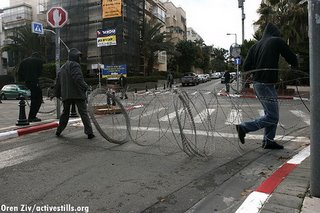Bringing Truth, and Tali, home

HOPING to start the New Year with some good news, I had instead to report the brutal Israeli military raid into Ramallah, in which four people were killed and tension deliberately exacerbated.
But there have been a couple of items on the happier side. First, Anarchists Against the Wall reported an imaginative action in Tel Aviv; activists bringing the occupation home by taking razor wire from the "security fence" to set up a downtown roadblock complete with military warning notices, blocking traffic and giving fellow-Israelis a small taste of what Palestinians have to put up with regularly.
http://awalls.org/tel_avivs_center_blocked_by_the_wall
Then came the news this week that Tali Fahima has been released after serving two and a half years in jail for her contacts with Palestinian militant Zakaria Zubeidi. Tali, born in 1976, is an Israeli woman from an Algerian Jewish family who grew up in Kiryat Gat, a city established on Arab land, now mainly home to poorer working-class Jews originating from Arab countries. She obtained a job as a legal secretary, and voted for the right-wing Likud party.
Then in 2003 Tali began to wonder what drove young Palestinians into such desparate attacks on Israel. She also became interested in the Palestinian children's theatre project started by Arna Mer-Khamis in Jenin, and started visiting the town, which had been devastated by a massive Israeli raid earlier that year, during which the children's theatre too was wrecked by Israeli soldiers.
Talking to people in Jenin, and hearing their views on the occupation and intifada, Tali began to rethink all her attitudes. She was particularly interested to meet Zakaria Zubeidi, who had featured with his mother in the film Arna's Children, about the theatre project, and had since become the leader in Jenin of the Al-Aqsa Martyr's Brigade.
In August 2004, Tali Fahima was arrested and interrogated by Shin Bet (Israeli security service) officers who wanted information about the people she had met in Jenin, probably hoping to turn her into an informer. Tali was neither able nor willing to help them, so in September she was placed under administrative detention - a measure inherited from the British Palestine mandate to hold "suspects" without trial or charges. Israel has seldom used these powers against Jewish prisoners.
Meanwhile Shin Bet agents had been briefing the press that Tali had been having an affair with Zubeidi. It was their way of demeaning both, as well as explaining how an "ordinary" Israeli Jewish woman could possibly consort with an "Arab terrorist".
In December 2004, Tali was charged with "assistance to the enemy at time of war". The substance of the charge to which she eventually entered a plea bargain, of meeting and aiding an "enemy agent", was that she was supposed to have translated an Israeli military document for the Palestinians. This was apparently a plan for a snatch or kill operation, containing three aerial maps of Jenin, names of wanted residents, and four photographs of them, one of them being Zubeidi. As a result he was able to warn others to go into hiding.
But as my friend Moshe Machover points out, Zakaria Zubeidi, who has spent time in work and prison in Israel, speaks and reads Hebrew, and would hardly have needed the Kiryat Gat secretary to translate and explain the document to him.
As Tali Fahima says: "My first crime was that I refused to work with Shin Bet, the second was that I insited on going to see the Palestinians and the third was that I protested against the Israeli policy of assassination".
At times Tali was kept handcuffed to her chair for 16 hours a day. Shin Bet said they wanted to teach her to be a "good Jew". For nine months of her time in prison she ws held in solitary, and not allowed to read or watch television. Her plea bargain should have meant a shorter sentence, but on 14 September the Parole Board ruled that she must not be released early because she had "acted in an insolent and rude manner towards prison guards".
Although now out of prison, Tali is restricted, like nuclear weapon whistleblower Mordechai Vanunu. She is banned from "leaving the country, contacting foreign agents or entering the Palestinian-controlled areas".
"I learnt about the nature of Shin Bet", she says, "how they terrorise us, both the Israelis and Palestinians. I learnt about the nature of the government, how they do not want us to see what is going on in our name."
Others have observed, made contacts, protested. But like Vanunu, Tali Fahima was from a Maghrebi (North African) family background, a member of Israel's "misrachi" ("oriental") working class upon which successive governments have relied for votes, work and cannon fodder, depending on their desire to prove their loyalty and anti-Arab sentiment. If any of them step out of line they could threaten the whole Zionist edifice. Tali Fahima was not some "advanced", way-out intellectual, but just an ordinary humdrum secretary who asked awkward questions about why her country knew no peace, and, looking for answers, talked to her Palestinian neighbours. That is probably why the state security organs had to make her an example by criminalising her.
That she has been released now, early, for "good conduct", is good news, not just for her, and not just because she should never have been jailed in the first place, but because it may hopefully indicate the security organs are not getting things all their own way now, amid political uncertainty.
"My crime was to protest at Israeli assassinations"
The Guardian, January 6, 2007
http://www.guardian.co.uk/international/story/0,,1983247,00.html
see also earlier interview: http://oznik.com/news/041006.html
Labels: Film and Theatre, Israel, Palestinians
1 Comments:
Charlie, your blog has become one of my regular reads. It is informative indeed, though it does not actually cheer me up.
Emm
Post a Comment
<< Home